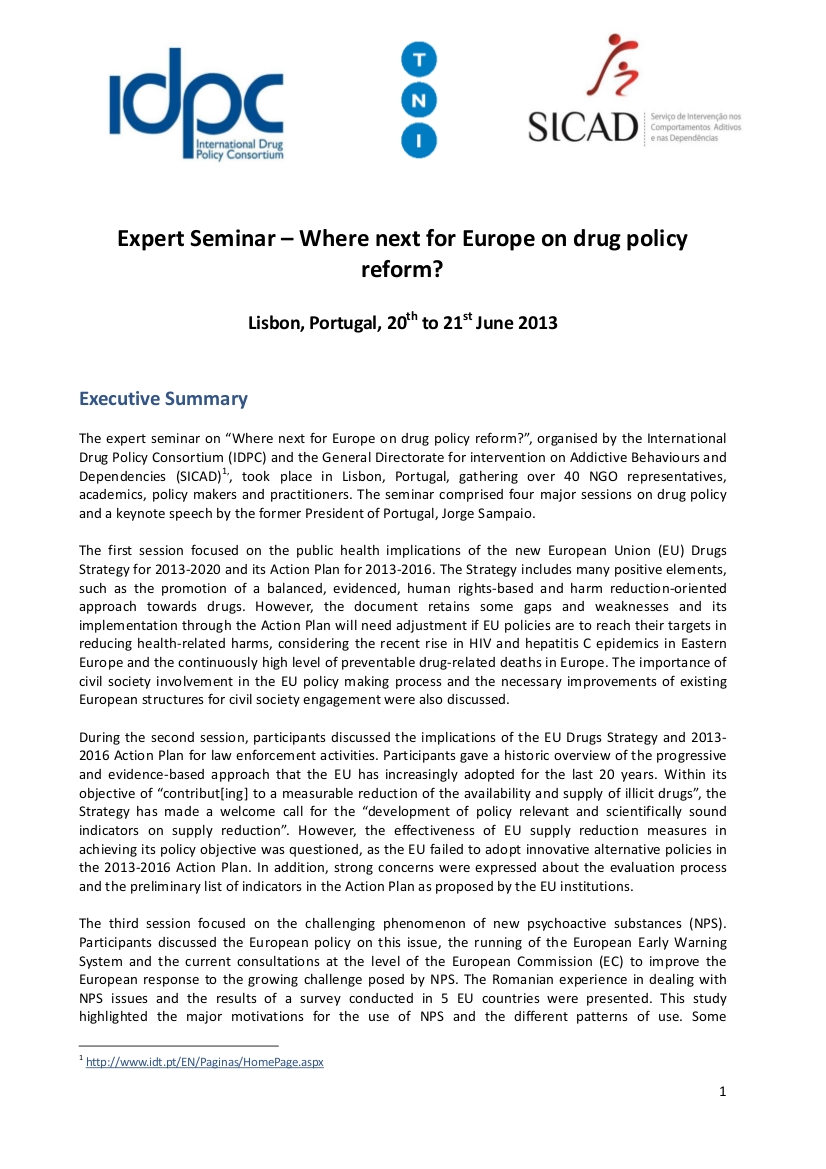Expert Seminar: Where next for Europe on drug policy reform?
Lisbon
June 20-21, 2013
 The expert seminar “Where next for Europe on drug policy reform?” analysed the new EU strategy on drugs and its action plan and discussed ways to improve and innovate European drug policy. The seminar comprised of four major sessions : the EU Drugs Strategy and Action Plan and its public health implications; the EU Drugs Strategy and Action Plan and its law enforcement implications; regional challenges and the issue of new psychoactive substances; the role of Europe in global drug policy and the European voice in preparation for the 2016 UNGASS. This report also contains the key note speech presented by the former President of Portugal, Jorge Sampaio.
The expert seminar “Where next for Europe on drug policy reform?” analysed the new EU strategy on drugs and its action plan and discussed ways to improve and innovate European drug policy. The seminar comprised of four major sessions : the EU Drugs Strategy and Action Plan and its public health implications; the EU Drugs Strategy and Action Plan and its law enforcement implications; regional challenges and the issue of new psychoactive substances; the role of Europe in global drug policy and the European voice in preparation for the 2016 UNGASS. This report also contains the key note speech presented by the former President of Portugal, Jorge Sampaio.
 Download the report (PDF, 809KB)
Download the report (PDF, 809KB)
The expert seminar on “Where next for Europe on drug policy reform?”, organised by the International Drug Policy Consortium (IDPC) and the General Directorate for intervention on Addictive Behaviours and Dependencies (SICAD) took place in Lisbon, Portugal, gathering over 40 NGO representatives, academics, policy makers and practitioners. The seminar comprised four major sessions on drug policy and a keynote speech by the former President of Portugal, Jorge Sampaio.
The first session focused on the public health implications of the new European Union (EU) Drugs Strategy for 2013-2020 and its Action Plan for 2013-2016. The Strategy includes many positive elements, such as the promotion of a balanced, evidenced, human rights-based and harm reduction-oriented approach towards drugs. However, the document retains some gaps and weaknesses and its implementation through the Action Plan will need adjustment if EU policies are to reach their targets in reducing health-related harms, considering the recent rise in HIV and hepatitis C epidemics in Eastern Europe and the continuously high level of preventable drug-related deaths in Europe. The importance of civil society involvement in the EU policy making process and the necessary improvements of existing European structures for civil society engagement were also discussed.
During the second session, participants discussed the implications of the EU Drugs Strategy and 2013- 2016 Action Plan for law enforcement activities. Participants gave a historic overview of the progressive and evidence-based approach that the EU has increasingly adopted for the last 20 years. Within its objective of “contribut[ing] to a measurable reduction of the availability and supply of illicit drugs”, the Strategy has made a welcome call for the “development of policy relevant and scientifically sound indicators on supply reduction”. However, the effectiveness of EU supply reduction measures in achieving its policy objective was questioned, as the EU failed to adopt innovative alternative policies in the 2013-2016 Action Plan. In addition, strong concerns were expressed about the evaluation process and the preliminary list of indicators in the Action Plan as proposed by the EU institutions.
The third session focused on the challenging phenomenon of new psychoactive substances (NPS). Participants discussed the European policy on this issue, the running of the European Early Warning System and the current consultations at the level of the European Commission (EC) to improve the European response to the growing challenge posed by NPS. The Romanian experience in dealing with NPS issues and the results of a survey conducted in 5 EU countries were presented. This study highlighted the major motivations for the use of NPS and the different patterns of use. Some participants considered the NPS issue as a missed opportunity for governments to effectively manage the illicit drug market. Instead of regulating it, governments went on criminalising and implementing law enforcement measures which led, in most cases, to mixed outcomes and problematic situations, where consumers moved to new, usually more dangerous substances. Moreover, they believed that repressive policies, and the current EU-level reform that is currently being discussed, will continue to lag behind drug designers and the changing nature of the NPS market.
The final session of the seminar focused on how civil society and the EU more generally can effectively influence the 2016 UN General Assembly Special Session on Drugs (UNGASS) preparations and directions. Globally, there is a growing sense that there is a need to reform current drug policies and explore alternative strategies. Several significant changes in the drug policy landscape occurred in the last decade, such as the global trend of decriminalisation. These changes are laying out a positive groundwork for the preparation of the 2016 UNGASS. Europe is probably the region with the most diverse experience, expertise and evidence around drug policy reform. It should therefore play a significant role in this debate to push the reform agenda and promote existing alternative and progressive policies. Participants discussed strategies and actions that civil society organisations should carry out in order to significantly influence UNGASS debates and outcomes.
The seminar is part of the New Approaches in Drug Policy & Interventions (NAPDI) project.








